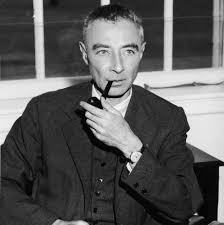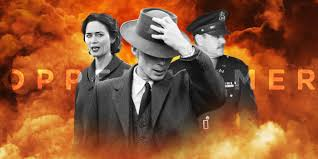Watch Download Oppenheimer (2023) Hindi Dubbed
J. Robert Oppenheimer (J. Robert Oppenheimer, 1904-1967) was an American theoretical physicist and World War II physicist. A key figure in the development of the atomic bomb during World War II. He is often referred to as the "Father of the Atomic Bomb".
Oppenheimer was born in New York and showed great academic ability from an early age. He completed his undergraduate and post-doctoral studies. He studied at Harvard University.
PhD in Theoretical Physics, University of Göttingen, Germany. After returning to the United States, he became a professor at the University of California at Berkeley, where he did important work in theoretical physics.
During World War II, Oppenheimer was put in charge of the Manhattan Project, which aimed to develop the atomic bomb. Under his leadership, the program successfully dropped the first atomic bombs on Hiroshima and Nagasaki, Japan in August 1945, leading to Japan's surrender and World War II. It led to the end of World War II.
After the war, Oppenheimer became a scientist and continued to do important work in theoretical physics. However, in the 1950s it faced controversy due to its past associations with left-leaning groups and public opposition to the hydrogen bomb. This led to a security hearing, and in 1954 his security clearance was revoked, effectively ending his term.
Oppenheimer continued his academic and research work for the rest of his life, eventually receiving many honors and awards for his contributions to physics. He died on February 18, 1967.
Despite Oppenheimer's controversial life, his legacy as a physicist and director of the Manhattan Project remains significant in the history of nuclear weapons research and development.
444 yes! Here are some key facts about J. Robert Oppenheimer:
Early Life and Education: Oppenheimer was born on April 22, 1904, in New York City to a wealthy Jewish family. His father Julius Oppenheimer was a successful industrialist.
Oppenheimer attended the Ethical Culture School in New York and then Harvard University at the age of 18. He graduated with honors in Chemistry in 1925.
The Influence of Quantum Mechanics: Oppenheimer's interest shifted from chemistry to theoretical physics while at the University of Cambridge, England, where he was influenced by quantum mechanics and other Influences by Max Born, Niels Bohr and Paul Dirac and famous physicists.
Radical thought and love of literature: Oppenheimer was known for his many interests, including literature and philosophy. He was fluent in many languages and was known for his active literature and poetry.
Contributions to theoretical physics: Prior to joining the Manhattan Project, Oppenheimer made significant contributions to theoretical physics, particularly in the fields of quantum mechanics, astrophysics, and spectroscopy. His work on electron-positron pairs, now known as the Oppenheimer-Phillips process, had important implications for understanding the stellar process.
Manhattan Project: Oppenheimer was appointed research director of the Manhattan Project in 1942. The program brought together physicists, engineers, and mathematicians to create the first atomic bomb in Los Alamos, New Mexico. Oppenheimer played a key role in overseeing the project's science and technology.
Trinity Test and Japanese Atomic Bomb Explosion: The Trinity Test, performed in the New Mexico desert on July 16, 1945, marked the successful detonation of the first atomic bomb. After seeing the explosion, Oppenheimer said, "Now I have become Death, the destroyer of the world," quoting a famous quote from the Hindu scriptures. This event paved the way for the dropping of atomic bombs on Hiroshima and Nagasaki.
Life After the War: After the war, Oppenheimer advocated international control of atomic weapons and was a leading voice in nuclear weapons control. He served as chairman of the U.S. Council of General Counselors.
S. Atomic Energy Commission.
Security Clearance Controversy: Oppenheimer's political affiliations and opposition to the missile led to his security clearance being revoked in 1954 during the second Red Scare and McCarthy term. This decision caused great controversy and affected his career.
Later work and legacy: Oppenheimer continued to contribute to physics despite losing his security clearance and was president of the Institute for Advanced Study in Princeton, New Jersey from 1947 to 1966.
He received many awards and accolades for his achievements throughout his life.
Death and Death Notices: J. Robert Oppenheimer died on February 18, 1967, of complications from throat cancer. His contributions to research and leadership on the Manhattan Project were crucial in the creation of history, and he is considered one of the most influential scientists of the 20th century.




Comments
Post a Comment